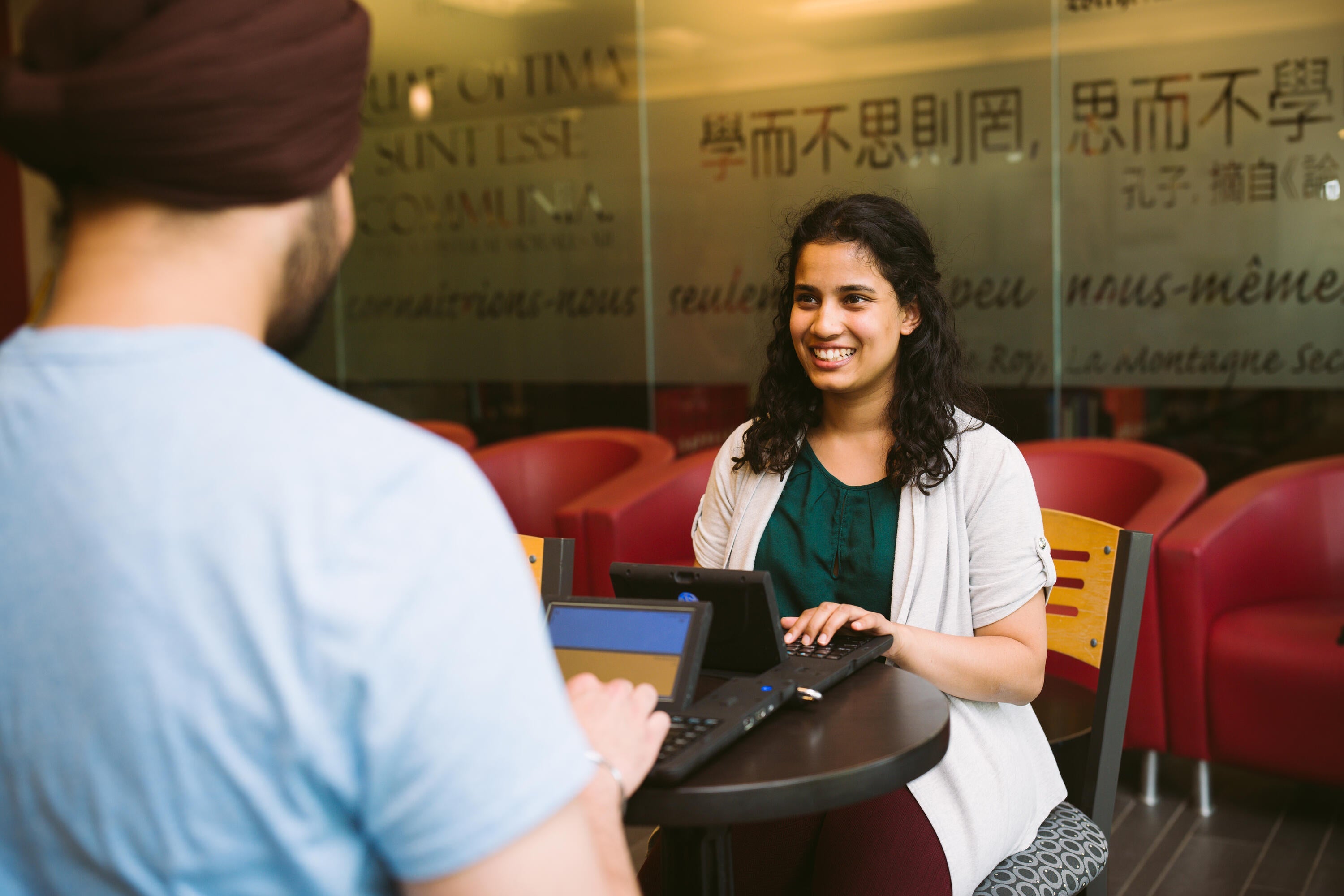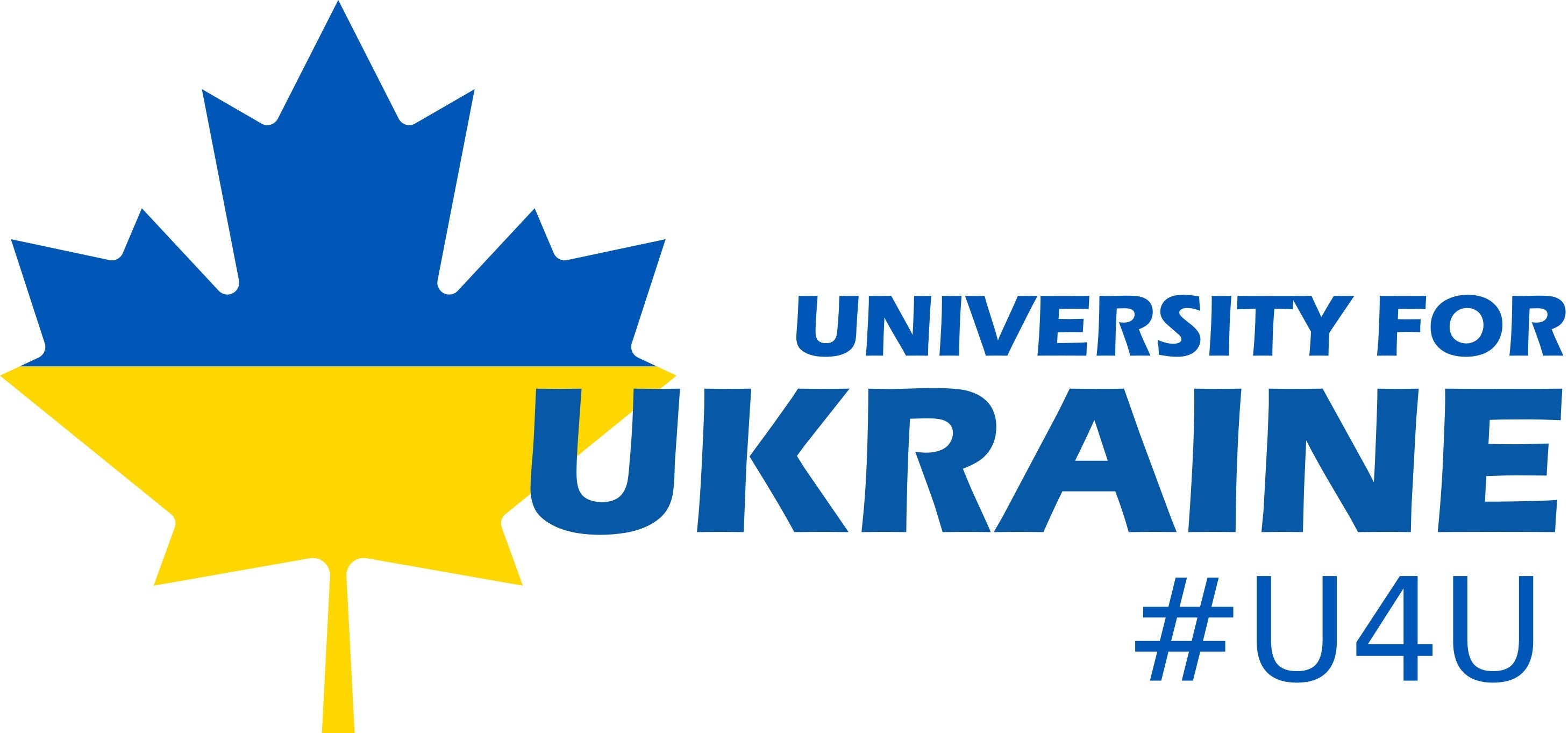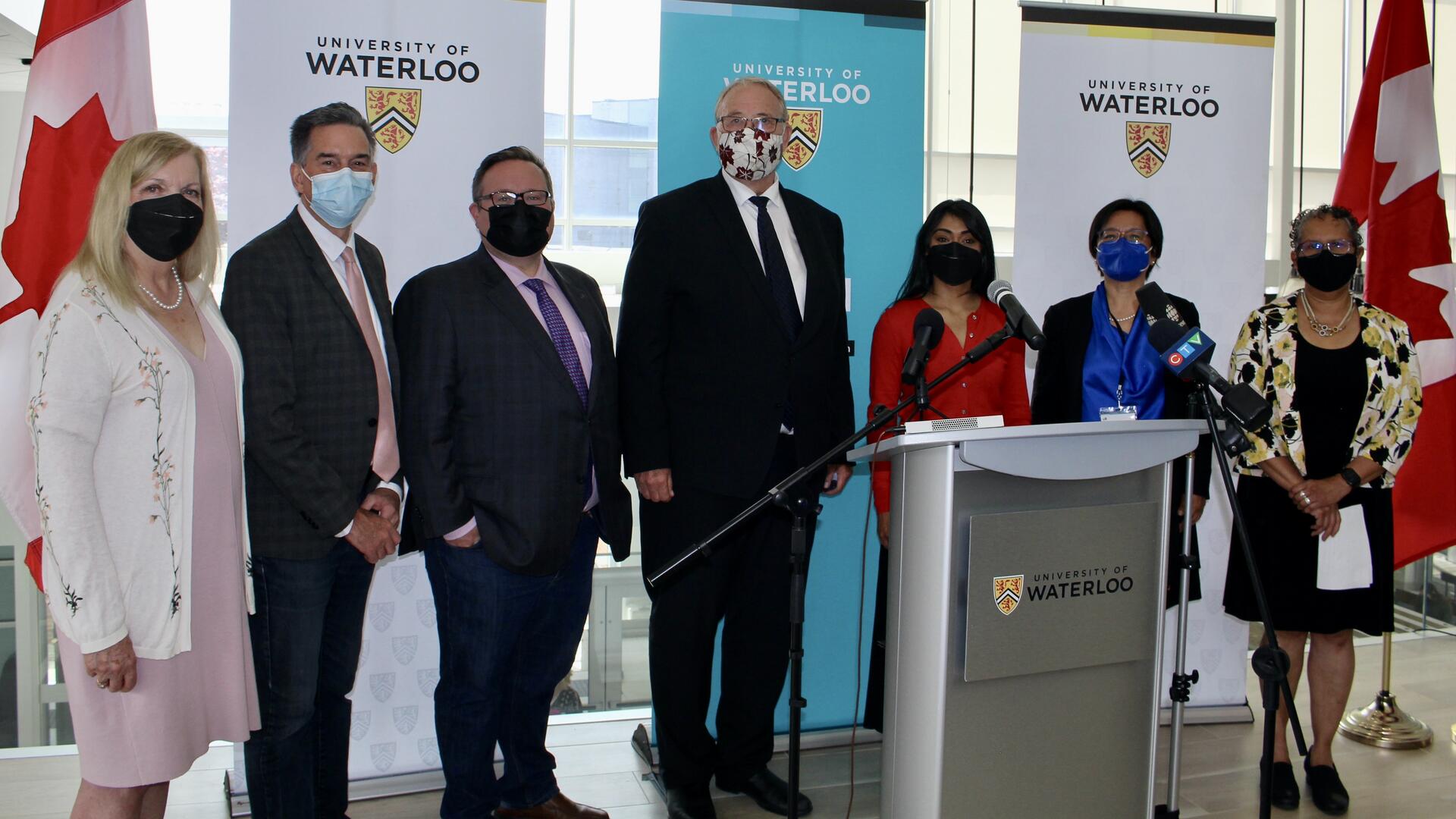- Waterloo at 100: what we're hearing
- Federal grant funding available for accessibility research
- Mobilizing support for war-torn Ukraine
- Cheriton researchers develop new passing models with NHL tracking data, win best research paper award at LINHAC 2022
- University of Waterloo receives funding for dementia search-and-rescue initiative
Editor:
Brandon Sweet
University Communications
bulletin@uwaterloo.ca
Waterloo at 100: what we're hearing
As we continue hearing from diverse voices during our Waterloo at 100 consultations, we are humbled by, and grateful for, the passion and insights coming from this community. As the University prepares for its long-term future, we are hearing imaginative solutions to challenges that will enable Waterloo to lead in inclusive and sustainable ways.
One of the questions that has enlivened our discussions about where the University should be on its 100th anniversary in 2057 is: Does Waterloo aspire to be more like traditional, globally recognized universities, or do we want to reaffirm the institution’s founding values, charting an unconventional path forward?
Here’s what we’re hearing:
- Many of the metrics that post-secondary institutions use today are based on a 19th-century model. Waterloo can define its own goals based on our differentiators and the needs emerging all around us. Waterloo can lead on its own terms to enable unique impacts that we can provide to our local community and the world at large.
- Waterloo should aspire to be “the best” in the world in a few select areas while being “among the best” in others
- The University needs to continue to work to find solutions to the systemic barriers faced by Black, Indigenous, 2SLGBTQ+ people; those living with disabilities and others who belong to under-represented or excluded groups.
- Waterloo must better articulate and deliver on the value of in-person and residential experiences as virtual institutions and organizations create intense competition for learners.
- Waterloo, a global leader in computing and data science, must find ways to use the University’s own data as a strategic resource to support the full range of activities from teaching to research and to help evolve the institution as a place where students and staff all thrive.
- Waterloo’s strong, historic connection to the local community is its fourth differentiator – perhaps one we should cite more often as its first differentiator. This relatively unique disposition for a university is an enduring one that constantly enriches the three other differentiators that make Waterloo remarkable — experiential education, entrepreneurship, and research with real-world impact.
- Given Waterloo’s capacity to innovate and generate an entrepreneurial spirit, we must foster stronger avenues to bring capital and broader supports to the dynamic and growing ecosystem of entrepreneurship, commercialization and social impact.
As we continue to meet with internal and external stakeholders over the summer, we encourage you to share the Waterloo at 100 webpage with your colleagues and networks where they can engage with the visioning exercise through a feedback form.
You can read other Waterloo at 100 newsletters here.
Please stay tuned as, over the summer, we are preparing a first draft of the Waterloo at 100 vision paper for broad input and feedback. We will be in touch when that paper is ready and look forward to your engagement.
Thank you again for sharing your ideas. Our long-term vision and best hope for the future will be supported through the diverse perspectives and insights of everyone in the Waterloo community.
Listen to Vivek Goel discuss Waterloo at 100 on the Beyond the Bulletin podcast:
Federal grant funding available for accessibility research

The APHR - Accessibility unit is sharing a federal grant opportunity for research and projects related to accessibility for persons with disabilities. Organizations can receive up to $250,000 per year, per project. The maximum amount available is $750,000 over three years.
The Grants and Contributions Program, Advancing Accessibility Standards Research, funds research projects that help identify and remove barriers to accessibility, as well as those aimed at preventing new barriers.
Projects must focus on one or more of the following priority areas:
- Canada’s election process, including voting and running for office
- communication, other than information and communication technologies, including accessible communications through sign language (American Sign Language, Langue des signes québécoise, Indigenous Sign Language)
- design and delivery of programs and services, including inclusive and accessible service delivery
- employment, including accessible employment for youth with disabilities transitioning from school to work
- information and communication technologies
- procurement of goods, services, and facilities
- the built environment
- transportation
Please consider submitting an expression of interest if you have research projects that try to:
- move accessibility standards research forward to help create a national network of accessibility expertise;
- involve people with disabilities, other experts, and organizations to inform the research; and
- identify and share research, information, best practices, and tools about accessibility barriers and standards.
Expressions of interest are due no later than 3:00 p.m. on August 5, 2022.
Read all the details of grants and contributions program online.
Mobilizing support for war-torn Ukraine

By Angie Docking. This article was originally featured on Waterloo News.
A grassroots fundraising and awareness initiative is underway on campus to support humanitarian relief efforts in Ukraine.
Led by faculty, staff and student volunteers, University for Ukraine (U4U) aims to bring together the University of Waterloo community to show solidarity and provide coordinated relief to war victims.
“I’ve spoken to several students, colleagues and friends who ask how they can help Ukrainians in a meaningful way,” said Professor Serhiy Yarusevych, a Ukrainian-Canadian mechanical and mechatronics engineering professor and U4U co-founder.
“That’s where the idea for U4U began – to provide every person on campus a quick and easy way to make a difference in the lives of Ukrainians shattered by war.”
Volunteers aim to raise close to $50,000 by September through the U4U fundraising platform and awareness events hosted across campus throughout the summer.
An unprecedented need
Now four months since the Russian invasion, the humanitarian need in Ukraine has fast outpaced international support, Yarusevych said.
“In the 21st century, the fact that a war of this scale is happening is truly mind-boggling,” he said. “More than half of Ukrainian families have been separated. Five million Ukrainian refugees have been driven abroad. More than 10 million people have been displaced internally.
“Russian president Vladimir Putin has said publicly he is betting on the world losing interest in helping Ukraine. We’re asking the Waterloo community to join us in proving him wrong.”
How you can help
Tax-deductible charitable donations can be made through the dedicated U4U online platform. Donors are welcome to select their charity of choice.
Join U4U for their upcoming kick-off event: The War in Ukraine: What’s Next? This event will feature an expert outlook on the Russian war in Ukraine provided by political science professors Alexander Lanoszka and John Jaworsky. Their presentation will be followed by a discussion forum.
Cheriton researchers develop new passing models with NHL tracking data, win best research paper award at LINHAC 2022
This article was originally published on the Cheriton School of Computer Science website.

PhD candidate David Radke and his co-supervisor, Professor Tim Brecht.
PhD candidate David Radke, Professor Tim Brecht, and their colleague (and David’s brother) Daniel Radke have received the best research paper award at LINHAC 2022, the Linköping Hockey Analytics Conference held in Sweden.
In their paper, “Identifying completed pass types and improving passing lane models,” the research team developed a mathematical model that uses puck-and-player tracking data to classify different types of completed passes and to determine the availability of potential pass receivers using data from 198 National Hockey League games.
To learn more about the research featured in this article, please see David Radke, Tim Brecht, Daniel Radke. Identifying Completed Pass Types and Improving Passing Lane Models. Linköping Hockey Analytics Conference (LINHAC 2022), June 6–8, 2022, Linköping, Sweden.
Please also see the paper synposis at https://cs.uwaterloo.ca/~dtradke/linhac22_lp.html and David’s conference presentation video below.
This new NHL puck-and-player tracking system, an analysis of the kinds of passes that can be extracted from it, and the model built to determine the size of passing lanes for completed direct and indirect passes have the promise to revolutionize hockey analytics, with implications for scouting, coaching, player development and fan engagement.
University of Waterloo receives funding for dementia search-and-rescue initiative

This article was originally featured on Waterloo News.
Sixty percent of people living with dementia go missing at least once, and among them, some will get lost repeatedly. In Indigenous communities, the rates of dementia are disproportionately higher than in the general Canadian population.
That is why the federal government has announced $2.1 million in funding over three years for a search-and-rescue project led by Lili Liu, Waterloo public health researcher and Dean of the Faculty of Health. Called Managing Risks of Going Missing among Persons Living with Dementia by Building Capacities of SAR Personnel, First Responders and Communities, the project will build capacity within the search-and-rescue community and with care partners to work with this population, build partnerships and increase coordination. It builds on the research Liu’s team has conducted over the past since 2015 through the AGE-WELL National Centre of Excellence program.
“The increasing number of Canadians living with dementia at risk of going missing is a public health concern,” said Liu. “We will build on existing expertise and partnerships to scale up strategies that enhance training, improve data collection, coordinate community resources and prevent repeat missing incidents.”
Liu noted that if a missing person with Alzheimer’s disease is not found within 24 hours, there is a 50 per cent chance that they will be found injured or dead from hypothermia, dehydration or drowning, making any search an emergency.
“Also, there is a myth that persons with dementia go missing only from their homes and that they are safe if secured in a monitored environment like a care facility,” Liu said. “But fewer than half of missing incidents occur at home, with 20 per cent from care facilities, 11 per cent from hospitals, and 22 per cent from the street, open or other spaces. Indigenous populations are under- or not represented in these statistics.”
In fact, much of the available data on missing persons with dementia is from the United States, so the project will involve data collection approaches to monitor the issue in Canada where climate, geography, funding and culture differ.
Minister of Emergency Preparedness Bill Blair was on campus to talk about the issue and the Search and Rescue New Initiatives Fund, which is designed to enhance the effectiveness, efficiency, economy and innovation of search and rescue in Canada.
“Our mandate is to keep Canadians safe from a range of risks,” Blair said. “Our population is aging and along with it, the number of people who go missing due to dementia is increasing. Our partnership with the University of Waterloo through the Search and Rescue New Initiatives Fund is a significant step in helping these vulnerable members of our communities get to safety."
Among other initiatives, the project’s researchers will collaborate with partners to implement and evaluate dementia-friendly resources for first responders in six provinces beyond Ontario, including two Indigenous communities (Peguis First Nation in Manitoba and Kahnawá:ke Mohawk Territory in Quebec), to collect data to assess the issue in Canada, and to create a guideline to help prevent reoccurrence of missing person incidents.
Link of the day
On this day in 1886: Canadian Pacific Railway makes its first voyage
When and Where to get support
Students can visit the Student Success Office online for supports including academic development, international student resources, immigration consulting, leadership development, exchange and study abroad, and opportunities to get involved.
Instructors looking for targeted support for developing online components for blended learning courses, transitioning remote to fully online courses, revising current online courses, and more please visit Agile Development | Centre for Extended Learning | University of Waterloo (uwaterloo.ca).
Instructors can visit the Keep Learning website to get support on adapting their teaching and learning plans for an online environment.
Course templates are available within your course in LEARN to help you build and edit your content and assignment pages quickly.
The following workshops, webinars, and events are offered by the KL team (CTE, CEL, ITMS, LIB):
-
Scholarship of Teaching and Learning (SoTL) Methods – self-directed, continuous self-enrollment course in LEARN.
-
Independent Blended Course Design (iBlend) - self-directed, continuous self-enrollment course in LEARN.
-
Copyright Overview for Waterloo Instructors and Staff - self-directed, continuous self-enrollment course in LEARN.
-
Independent Remote Course Design Essentials (iReCoDE) - self-directed, continuous self-enrollment course in LEARN.
-
Supporting Student Mental Health (for Instructors) – self-directed, continuous self-enrollment course in LEARN.
Supports are available for employees returning to campus. Visit IST’s Hybrid Work and Technology guidelines and workplace protocols to assist with the transition.
The Writing and Communication Centre has in-person and virtual services to support grad and undergrad students, postdocs and faculty with any writing or communication project. Services include one-to-one appointments, drop-ins at Dana Porter Library, online workshops, writing groups, English conversation practice, and custom in-class workshops.
Co-op students can get help finding a job and find supports to successfully work remotely, develop new skills, access wellness and career information, and contact a co-op or career advisor.
The Centre for Career Action (CCA) has services and programs to support undergrads, grad students, postdocs, alumni, and employees in figuring out what they value, what they’re good at, and how to access meaningful work, co-op, volunteer, or graduate/professional school opportunities. Questions about CCA's services? Live chat, call 519-888-4047, or stop by our front desk in the Tatham Centre 8:30 a.m. to 4:30 p.m., Monday to Friday.
Drop-in to Warrior Virtual Study Halls on Wednesdays from 5:30 p.m. to 7:00 p.m. Come together in this virtual space to set goals and work independently or in groups each week.
Renison's English Language Institute continues to offer virtual events and workshops to help students practice their English language skills.
If you feel overwhelmed or anxious and need to talk to somebody, please contact the University’s Campus Wellness services, either Health Services or Counselling Services. You can also contact the University's Centre for Mental Health Research and Treatment. Good2Talk is a post-secondary student helpline available to all students.
The Library is open with expanded hours for access to book stacks, drop-in individual study space, bookable group study rooms, drop-in access to computers and printers, book pick-up services and IST Help Desk support. Librarian consultations, Special Collections & Archives and the Geospatial Centre are available by appointment. Full details on current services and hours are available on the Library’s COVID-19 Update webpage.
The Faculty Association of the University of Waterloo (FAUW) continues to advocate for its members. Check out the FAUW blog for more information.
The University of Waterloo Staff Association (UWSA) continues to advocate for its members. Check out the UWSA blog for more information.
The Sexual Violence Prevention and Response Office (SVPRO) supports all members of the University of Waterloo campus community who have experienced, or been impacted, by sexual violence. This includes all students, staff, faculty and visitors on the main campus, the satellite campuses, and at the affiliated and federated Waterloo Institutes and Colleges. For support, email: svpro@uwaterloo.ca or visit the SVPRO website.
The Office of Indigenous Relations is a central hub that provides guidance, support, and resources to all Indigenous and non-Indigenous campus community members and oversees the University's Indigenization strategy.
The Waterloo Indigenous Student Centre, based at St. Paul’s University College, provides support and resources for Indigenous students, and educational outreach programs for the broader community, including lectures, and events.
WUSA supports for students:
Peer support - MATES, Glow Centre, RAISE, Women’s Centre - Visit https://wusa.ca/services/wusa-peer-support to book an appointment either in person or online for the Fall term.
Food Support Service food hampers are currently available from the Turnkey Desk 24/7 in the Student Life Centre. Drop off locations are also open again in SLC, DC, DP, SCH and all residences.
Co-op Connection all available online. Check https://wusa.ca for more details.
Centre for Academic Policy Support - CAPS is here to assist Waterloo undergraduates throughout their experience in navigating academic policy in the instances of filing petitions, grievances and appeals. Please contact them at caps@wusa.ca. More information is available.
WUSA Student Legal Protection Program - Seeking legal counsel can be intimidating, especially if it’s your first time facing a legal issue. The legal assistance helpline provides quick access to legal advice in any area of law, including criminal. Just call 1-833-202-4571.
Empower Me is a confidential mental health and wellness service that connects students with qualified counsellors 24/7. They can be reached at 1-833-628-5589.
GSA-UW supports for graduate students:
The Graduate Student Association (GSA-UW) supports students’ academic and social experience and promotes their well-being.
Advising and Support - The GSA advises graduate students experiencing challenges and can help with navigating university policies & filing a grievance, appeal, or petition.
Mental Health covered by the Health Plan - The GSA Health Plan now has an 80 per cent coverage rate (up to $800/year) for Mental Health Practitioners. Your plan includes coverage for psychologists, registered social workers, psychotherapists, and clinical counselors.
Dental Care - The GSA Dental Plan covers 60 to 70 per cent of your dental costs and by visiting dental professionals who are members of the Studentcare Networks, you can receive an additional 20 to 30 per cent coverage.
Student Legal Protection Program - Your GSA fees give you access to unlimited legal advice, accessible via a toll-free helpline: +1-833-202-4571. This advice covers topics including housing disputes, employment disputes, and disputes with an academic institution.
The Graduate House: Open Monday to Tuesday 11:30 a.m. to 7:00 p.m. and Wednesday to Friday 11:30 a.m. to 9:00 p.m. We’re open to all students, faculty, staff, and community members. The Graduate House is a community space run by the GSA-UW. We’re adding new items to the menu. Graduate students who paid their fees can get discounts and free coffee.
When and Where (but mostly when)
Warriors vs. Laurier Blood Donation Battle. Join our “Waterloo Warriors” team on the Blood.ca website or app. #ItsInYouToGive
Warriors Custom Apparel Program June 22 – July 13. Purchase customized team specific gear to get ready for the 2022-2023 season. Hoodies, Hats, Jerseys, T-shirts and more. Buy now!
Warriors Youth Summer Day Camps, July 4 to September 2. Open to boys and girls age 5-18. Baseball, Basketball, Football, Hockey, Multi-Sport and Games & Volleyball. Register today.
Valuation of water quality in Canada: An overview of the upcoming policy needs and challenges, presented by Jean-Michel Larivière, Environment and Climate Change Canada. Part of the Water Institute's webinar series: The Value of Water in Canada. Wednesday, July 6, 12:00 p.m.
WaterTalk - Nature Water: A journal for all water-related research, presented by Fabio Pulizzi. Thursday, July 7, 10:00 a.m.
NEW - WISE Workshop, “Introduction to Feedback-Based Optimization and Applications to Energy Systems” by Daniel Eduardo Olivares Quero, Monday, July 11, 9:00 a.m. to 4:00 p.m., In-person at Evolv1 Classroom.